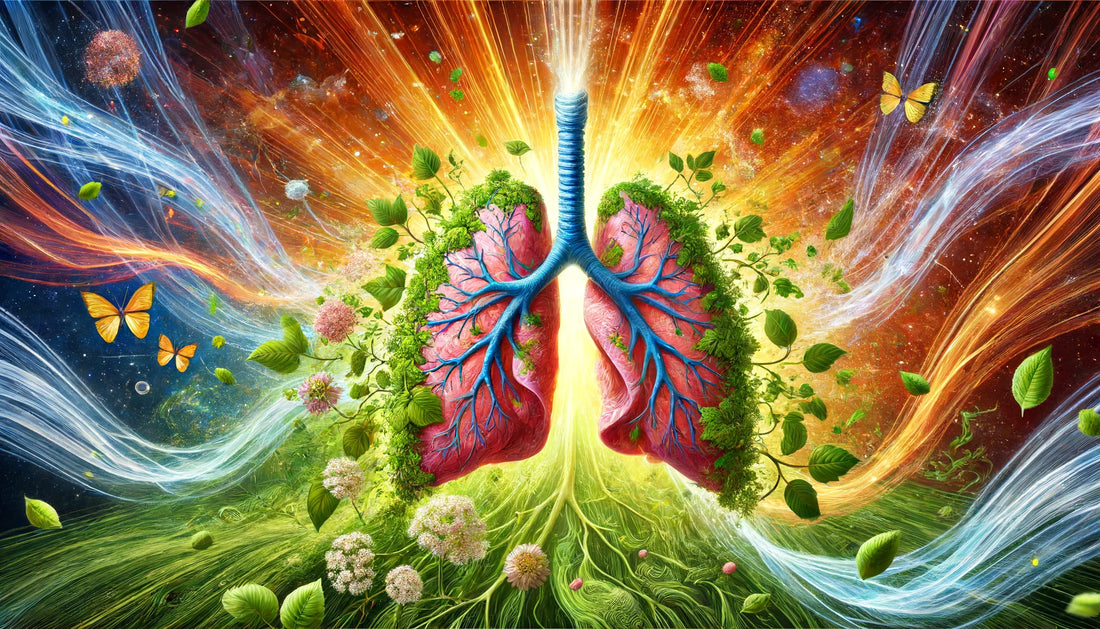
The Detoxifying Power of the Lungs
Share
Unlocking Vitality: The Crucial Role of Lung Health in Detoxification and Mental Well-Being
Our lungs are often overshadowed by more conspicuous aspects of health, yet they play an indispensable role in detoxifying the body and maintaining mental clarity and emotional balance. Understanding the significance of lung function, particularly the process of expiration, reveals how crucial it is for our overall well-being.
The Detoxifying Power of the Lungs
- Expiration and Carbon Dioxide Removal:
- Efficient Gas Exchange: The primary function of the lungs is to facilitate the exchange of gases—oxygen and carbon dioxide—between the air we breathe and our bloodstream. When we inhale, oxygen enters the lungs and diffuses into the blood. During expiration, carbon dioxide, a waste product of cellular metabolism, is expelled from the body. Efficient expiration ensures that carbon dioxide levels in the blood are kept in check, maintaining the body’s acid-base balance and preventing respiratory acidosis, which can lead to various health complications.
- Acid-Base Balance: By regulating the levels of carbon dioxide, the lungs help maintain the pH balance of the blood. An imbalance in pH can affect enzyme activity and disrupt metabolic processes, leading to a range of health issues. Proper lung function ensures this balance is maintained, contributing to overall metabolic health.
- Oxygen Delivery and Toxin Removal:
- Optimal Oxygen Supply: Healthy lung function ensures that oxygen is efficiently delivered to the bloodstream and subsequently to every cell in the body. Oxygen is vital for the cellular processes that produce energy and facilitate the removal of metabolic waste products. This process supports the detoxification functions of other organs, such as the liver and kidneys, which rely on a steady supply of oxygen to filter and remove toxins from the blood.
- Enhanced Cellular Detoxification: Oxygenation also promotes the function of the mitochondria, the powerhouse of the cell, which is crucial for cellular respiration and energy production. Efficient cellular respiration helps cells eliminate waste products and toxins, preventing cellular damage and promoting overall health.
Mental Health and Emotional Well-Being
- Stress Reduction and Emotional Balance:
- Breath and the Nervous System: Deep, controlled breathing, particularly practices such as diaphragmatic breathing and pranayama, stimulates the parasympathetic nervous system. This system is responsible for the body's 'rest and digest' functions, counteracting the 'fight or flight' response associated with stress. By activating the parasympathetic nervous system, deep breathing helps reduce stress hormones, lower heart rate, and promote a state of relaxation and emotional balance.
- Mood Regulation: Proper oxygenation of the brain through efficient lung function is essential for the synthesis and regulation of neurotransmitters such as serotonin and dopamine, which play key roles in mood regulation. Improved lung health can help mitigate symptoms of anxiety and depression by ensuring that the brain receives the oxygen it needs to maintain a balanced mood.
- Cognitive Function and Clarity:
- Enhanced Cognitive Abilities: The brain is highly sensitive to changes in oxygen levels. Adequate oxygenation through healthy lung function supports cognitive functions such as attention, memory, and executive function. This is why activities that promote deep, rhythmic breathing can lead to improved mental clarity, better focus, and enhanced problem-solving abilities.
- Neuroprotection: Chronic oxygen deficiency, even at low levels, can contribute to neurodegenerative conditions over time. Maintaining optimal lung health helps protect brain cells from oxidative stress and damage, potentially reducing the risk of conditions such as Alzheimer’s disease and other forms of dementia.
Practical Steps to Enhance Lung Health
- Regular Aerobic Exercise:
- Engage in activities such as walking, running, cycling, or swimming to strengthen the respiratory muscles and improve lung capacity. Regular exercise enhances overall cardiovascular fitness and promotes efficient oxygen delivery and carbon dioxide removal.
- Breathing Exercises:
- Incorporate practices such as deep diaphragmatic breathing, pursed-lip breathing, and yoga-based pranayama to enhance lung function. Use tools and support to help guide your progression. These exercises can help increase lung capacity, improve oxygenation, and promote relaxation.
- Avoiding Pollutants:
- Minimize exposure to air pollutants, smoke, and other respiratory irritants. Ensure good indoor air quality by using air purifiers and maintaining proper ventilation. Avoid smoking and limit exposure to secondhand smoke to protect lung health.
- Healthy Lifestyle Choices:
- Maintain a balanced diet, one that works for you, rich in antioxidants, nutrients and anti-inflammatory foods to support overall respiratory health. Stay hydrated to keep the mucosal linings in the lungs thin and fluid, aiding in efficient gas exchange and toxin removal.
In Conclusion
Prioritizing lung health is a gateway to comprehensive well-being. By focusing on practices that enhance lung function and expiration, you not only support efficient detoxification but also promote mental clarity, emotional balance, and cognitive vitality. Embrace the transformative power of healthy lungs and experience a life of enhanced physical and mental health. Breathe deeply, live fully, and unlock your true potential.
